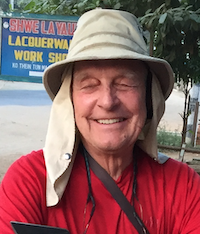Table of Contents (TOC)
quick links to main Travel Safety posts
1) Safety: Introduction & Risks
5) Soft Crime & Scams
I. Pickpockets:
Hidden Money locations
II. Theft
III. Retailers & Bargaining
... bargaining game
IV. Touts
V. Scams
First, I must be clear, —— soft crime seldom poses any physical danger,
.... but RULE#1: “NEVER resist.!!”.
The usual risk … is losing your money & stuff or being conned into or out of something by pickpockets, or taxi drivers, a few tourist vendors & diverse scammers. They have no interest in doing you bodily harm. It’s a game of wits & skills for something of value.
So, quaking in fear over threats you know nothing about is unnecessary when I can teach you what the soft crime dangers are and how to usually avoid them.
You teach a young child. ‘not to run with scissors’, and ‘look before crossing’ … to protect them from dangers they have not yet recognized. That is how we humans learn to be safe.
Please, let me teach you how to be safer.
◀︎◀︎◀︎ Scroll UP ▲ to return here to TOC
In this post, I will discuss specific threats — pickpockets & scammers — in detail.
'Transportation’ related risks/crimes & criminal (in particular, taxi drivers) are specifically addressed in the following 2 posts ... FOUND in the TOC (Table of Contents) at upper left in this post.
a. Transportation risks: 6) Trans: airport > Hostel
b. Transportation risks: 7) Trans: in-town & country
Once you recognize a scam & how it works you may well avoid & frustrate it.
I. Pickpockets:
A. Define Pickpocketing?
Pickpocketing is the larceny or theft —grand or petty — of money or other personal property from a victim's pocket/ person. daypack, fanny pack —- without them noticing. Pickpocketing can be an art form born of constant street training, practice & experience.
B. Pickpocket’s skills?
Author Charles Dickens’ “Oliver Twist” fictional character, Fagin, used a ‘game’ to teach 'pickpocketing' to his young street boys, like a legendary pickpocket, Artful Dodger,….
Fagin's Pickpocket Training
“When the breakfast was cleared away, the merry old gentleman and the two boys played at a very curious and uncommon game…The merry old gentleman, placing a snuff-box in one pocket of his trousers, a note-case in the other, and a watch in his waistcoat pocket, with a guard chain round his neck, and sticking a mock diamond pin his shirt, buttoned his coat right round him, and putting his spectacle-case and handkerchief in his pockets, trotted up and down the room with a stick…
All this time the two boys followed him closely about; getting out of his sight so nimbly, every time he turned round…If the old gentleman felt a hand in any one of his pockets he cried out where it was; and then the game began all over again.”
Arriving much earlier than other tourists at Kruja’s Castle, I had been roaming thru the main castle grounds & had just entered the novel, ancient, still occupied original castle’s residential area when I was casually app
You may practice tennis, pottery throwing or computer games, but these pickpockets practice just as hard to steal your stuff. These people are good.
A Pickpockets’s hand is so deftly skilled that you won't know your money is gone until you reach for it. Even then, the theft may have been so well done, you’ll think you left your money in your hostel.
ANECDOTE: Cop's pickpocket😇
Yes, police sometimes hire crooks.
In a recent TV series episode clip (I can’t remember which): an undercover police detective is hiring a potential pickpocket to assist his investigation. (Police do hire dubious characters.)
Detective asks the pickpocket to prove his skills by stealing the detective’s wallet from inside his jacket.
The pickpocket walks up to him & just as quickly walks past him.
The wry detective turns to the pickpocket saying, “You didn’t steal my wallet.”
Pickpocket, with a tiny flicker of a smile, replies, ” No, I took the money out & left the wallet.”
My point, is you won’t even know you have been pick'd until you can’t find your money.
Resource 1 below illustrates this skill — you’ll love it.
RESOURCE 1: Actual ‘How to’ pickpocketing video - Excellent:
YouTube video: Master Pickpocket Breaks Down 12 Pickpocketing Tricks In Movies: https://www.youtube.com/watch?v=89oJojtDVJk
RESOURCE 2: 10 Most Likely Pickpocket Cities
TripAdvisor’s top 10 MOST LIKELY PICKPOCKET cities: https://tripadvisor.mediaroom.com/2009-09-25-TRIPADVISOR-HIGHLIGHTS-TOP-10-PLACES-WORLDWIDE-TO-BEWARE-PICKPOCKETS
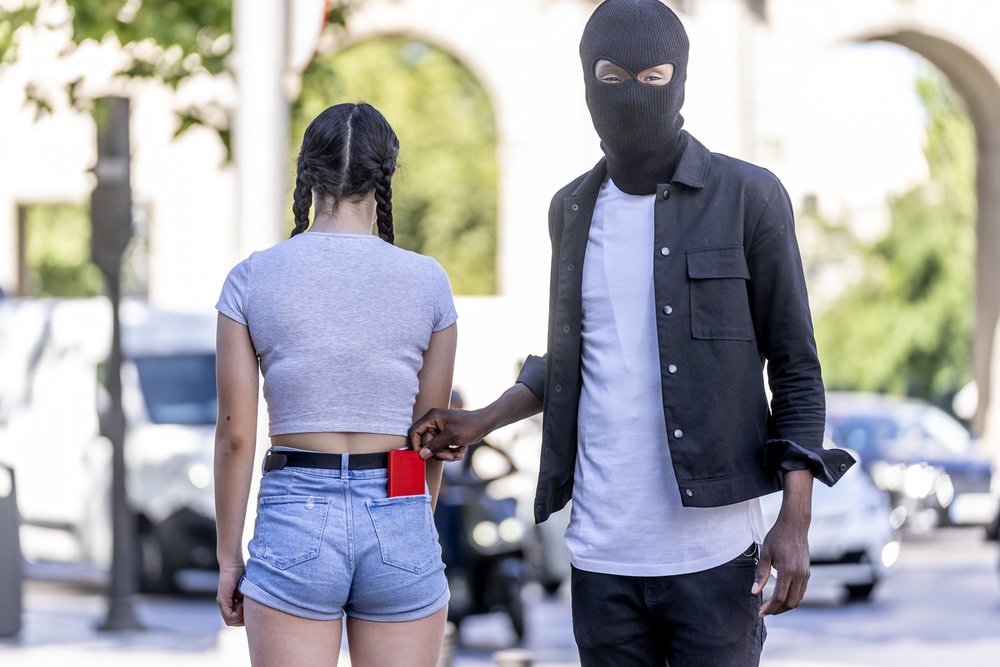
C. Where are pickpockets?
….. Wherever tourists might be!
Asa Brook's book entitled “Bears are where they find you.” 
Crowded tourist sites, congested train platforms, sardine-packed commuter trains & buses, busy transportation hubs, sleeper buses/trains, & tourist street crowds.
If you are- a tourist - anywhere, ... assume pickpockets are there.
D. How pickpockets choose their tourist?
As discussed in my earlier blogs, Tourist Appearance [Click "2) Tourist Appearance' in TOC above left] & Tourist Behavior [Click "3) Tourist Behavior' in TOC above left] ..... often instantly alerts the skilled pickpocket .... that you are tired, disoriented & confused, dressed too differently, too careless, or too distracted.
You look too preoccupied reading maps or guidebooks,  expensive gear, flaunting cash, taking unrecognized risks in dangerous places, wearing a daypack or fanny pack, &, sadly, perhaps even an arrogant, demanding, or disrespectful attitude, etc., etc., etc.
expensive gear, flaunting cash, taking unrecognized risks in dangerous places, wearing a daypack or fanny pack, &, sadly, perhaps even an arrogant, demanding, or disrespectful attitude, etc., etc., etc.
Granted this may seem a hyperbolic ‘tourist description’, but some of it applies to most foreign travelers including me. The more vulnerable you look & act, the more ‘you’ are the target.
But to be fair to ourselves, we tourists came to be thrilled, not fight soft crimes.
Most pickpockets want money or the ubiquitous cell phone, so let’s disregard all other items for the moment.
A Pickpockets’s hand is so deftly skilled that you won't know your money or cell is gone until you reach for it. Even then, the theft was so well done, you’ll wonder if you even brought your money or cell.
E. How will you know you’ve been pick'd?
If they are good, you won’t know …. until you reach for your money or cell, and its gone,
or you wake up on the night bus & the camera slung over your neck is gone,
or, you swing your day pack off to discover the compartments are wide open & stuff is missing,
or, your fanny pack belt was sliced by a razor knife & its gone.
Getting the point?😀
Typical targets of pickpockets are money, cell phone, or maybe a watch and anything else they discover rummaging quickly in your pockets.
Local currency or, if thief is lucky, US or Euro money, has instant value, while a cell or watch will be sold on the black market for gain.
NOTE: Avoid carrying a wallet, purse, daypack, or belly pack. A pickpocket knows that is where YOUR valued stuff is (money, credit cards, etc)
What is normal at home is a thieves target & often unnecessary weight.
So, if I get ‘pick'd’, small $ loss & zero danger.
If I do get robbed, I will fake whimpering while begging for a little bit back so ... criminals will think that they've really been successful and melt away.
Nevertheless, I still believe that If a pickpocket can get my cash, wallet, passport, etc --- it is probably my fault!!!
Let me show you how I try to protect myself against pickpocketing of money & cell.
SAFE PRACTICE: Hidden Money,Cell,Decoy Money
A. My Cell Phone Safety Strategy
1. Protect from pickpocket theft.
2. ... minimize unnecessary public visibility & use of my cell phone.
I might use my cell for Google Maps
when lost, but nothing else that might be done more safely from my hostel bed.
B. My Money SafetyStrategy
1. Carry enough money for my anticipated daily needs (lunch snacks museum tickets etc.), and …
2. Enough money to cope with emergencies including having my ‘daily needs money’ pickpocketed or suffering some more serious unforeseen event requiring medical fees, expensive taxi, etc.
C. Specific Tactics:
1. Daily 'Cash Decoy’:
Carry a sheaf of small folded bills in your pocket that you think  reasonable (?) for a normal day’s needs and that you are willing to lose to a pickpocket. Place these bills where the pickpocket is most likely to look e.g. back/front pants pocket, jacket pocket, etc.
reasonable (?) for a normal day’s needs and that you are willing to lose to a pickpocket. Place these bills where the pickpocket is most likely to look e.g. back/front pants pocket, jacket pocket, etc.
On the rare chance that I am targeted, I want the skilled pickpocket ... who knows most tourists carry some cash, ...to feel she has succeeded and to sneak away without looking further.
Later, when safe, I retrieve my 'hidden stash' and go on my way.
This tactic serves 2 functions: 1) you only lose your small 'daily decoy' cash even if you don't know you have lost it yet and 2) if you don't get picked that's the amount of money you needed for that day anyway.
2. 'Hidden' Emergency Money
My Life experience has taught me that you --
1) ... can't be paranoid enough,
2) ... usually don’t see catastrophes coming and
3) .. need enough immediately available cash to buy my way out of most traveler’s ‘lost’ or dicey situations.
The "money issue' is complicated when you walkabout a foreign city or remote village for a day. How do you protect your cash against clever, almost street art, pickpockets, and scammers?
Anecdote 1: My Oregon RV flood destruction.
Several years ago I slept in my small RV alongside Highway 101 north of Tillamook, Oregon, USA, several miles from the Pacific Ocean. The last 2 nights' heavy logging trucks roared by all night.
BUT, on 3rd night, I woke at 4:00 am & wondered why all was quiet. I peeked out my window & looked into a lake. I jumped out of bed into water.
In a panic, I drove 50 yards to the blinking police lights thereby destroying my $55K Roadtrek 200 van.’
Later the police & locals said they never saw a flood coming. I had camped in similar places hundreds of times over the last 30 years. The replacement van I bought 5 days later cost $35k.
Anecdote 2: Japan train > taxi incident
Traveling to a Japanese Castle I missed my train transfer to another train because I was jabbering with a fellow passenger about Apple Computer products. I jumped off at the next stop, but no immediate ongoing train was available. So,I paid $100 US for a taxi ride to get to the castle on my schedule.
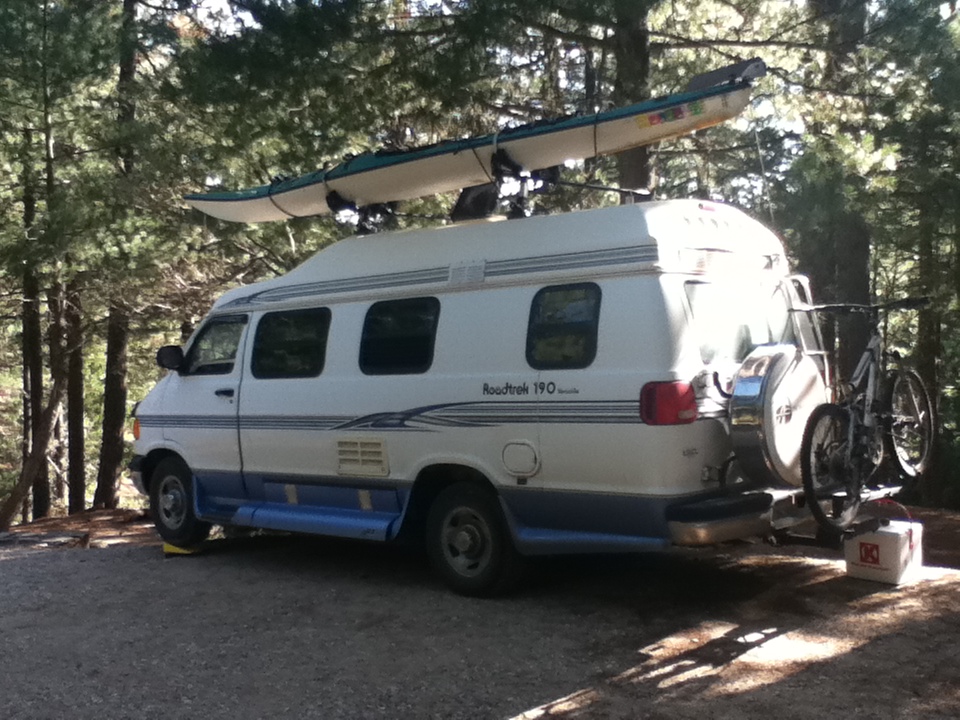
3. Hidden Money Locations
tailor my ideas to your wardrobe.
a. Hat:
Tilley hats" (https://tilley.com/collections/best-brimmed-hats
I traveled N America & world for more than 25 years with a Tilley hat, replaced twice under their lifetime warranty when I wore them out.

The Tilley hat has a secret compartment on the inside top where I would store $20-$30 USD or equivalent local currency
.
- (SEE where the $20 USD is sticking out) →→→→↘︎
I also installed a wrap-around cape that could be snapped closed in front of my face against mosquitoes, wind & rain.

 'Snap' is just below center top of cape front in left PIK
'Snap' is just below center top of cape front in left PIK
b. Jackets & Vests:
1) All Jackets:
In each JKT install a 'money pocket' under inside left arm pit, so you can easily reach money with your right hand, unless you are left-handed.
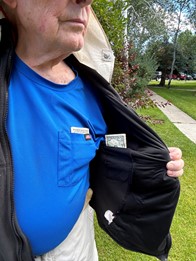
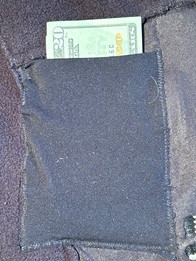
2) Heavy Jacket's additional modifications & safety features:
1) Large rain pants pocket. Designed to securely carry my rolled-up rain pants, pair of gloves & other small stuff INSIDE jacket.
Note: Long black 'blob' at left top is the rolled up rain pants, while small black blob' on top  right are gloves. All fits neatly in the long red pocket with black velcro ties downs.
right are gloves. All fits neatly in the long red pocket with black velcro ties downs.
Also, I positioned this red pocket so that it fit nicely in the small of my back.
Even when my jacket is rolled up & tied around my waist, full rain pocket just hangs down bouncing on my butt a bit with each step, BUT ultimately reducing any need for a daypack
See pplk: Wardrobe post {Resources>. Equip]
2) Security snap-lock buckles:
'Clothing Arts' installed tiny security snap-lock buckles in addition to pocket zippers making it  even more difficult for pickpockets to get inside those 'protected' pockets.
even more difficult for pickpockets to get inside those 'protected' pockets.
(1 PIKs: tiny security snap lock buckles in addition to pocket zippers
CELL Phone Caution: many modern jackets have an exterior left breast pocket apparently designed for a cell phone. Laughably accessible to even an unskilled pickpocket, particularly when they see you use your cell & put it back in that same pocket.
c. Dress Shirt:
While my rolled-up dress shirt contains no hidden pockets, when wrapped around my waist, it hangs down perhaps 4 to 8 inches providing a curtain that hides my pant’s pockets.
Often worn as a chilly early morning jacket, it also 'somewhat' hides my video camera. (PIKs- full garb w/ dress shirt & video camera).
d. T-shirts
I carry 2-3 lightweight, synthetic, quick-drying T-shirts with a chest pocket (mine or mfgr's) large enough for folded money bills. 
I can't speak to a woman's analogous garment except to suggest: keep it simple, easily washed & dried without ironing i.e minimal maintenance.
Seems contradictory, but I carry my 'decoy' money here for 1) my convenience & 2) as a decoy.
e. Short/Pant/Dress/Skirt:
Must carry $ hidden from all but your lover.😃
Even if they were to ‘pat me down’ unlikely to invade my crotch.
1) Cash Pocket:

My cargo shorts & pants 'cash' and 'cell phone's hidden 'pockets are inside pants in crotch where ONLY I could reach them by loosening my belt and reaching down inside my shorts/pants.
Note: For illustration, these shorts are turned inside out which means the pockets are flipped when the shorts are normal. I.e. cell phone pocket is on the right money pocket on the left.

Note: Use same colored thread as shorts/pants/skirt so pocket outline is not easily visible
Hidden 'money pocket' is described: 1) directly above under: "b. Jackets/Vest/Dres/Skirt",
&
2) more with "How to ..." info. [pplk: sub-post: Wardrobe modifications]
2) Cell Phone Pocket:
The larger "cell phone pocket with case' is installed on left side when shorts worn ('cash pocket of right side).
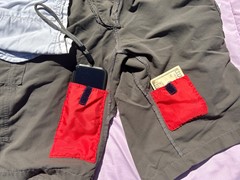
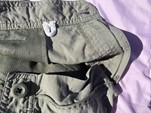

Note: Cell phone has a lanyard on it which attachs to a small loop [lk] on the top inside of my short's waistband so won't be stolen or lost even inadvertaintly (during a trip & fall.)
Hopefully, a pickpocket could not get these monies and cell phone .... without …. 1st marrying me.
See [pplk: sub-post: Wardrobe modifications].
f. Travel Belt with hidden zippered pocket:
Such belts have a long, thin zippered compartment on backside which, of course, is worn hidden facing your body.
In it, I carried ---
a) 2 US $100s & 2 large local bills folded lengthwise to fit.
b) 2 US $100s & 2 large local bills folded lengthwise to fit.
c) a tiny laminated summary of credit/debit card numbers & pins that I could never remember. For "How to ..." SEE: [pplk: post: Wardrobe: travel belt]
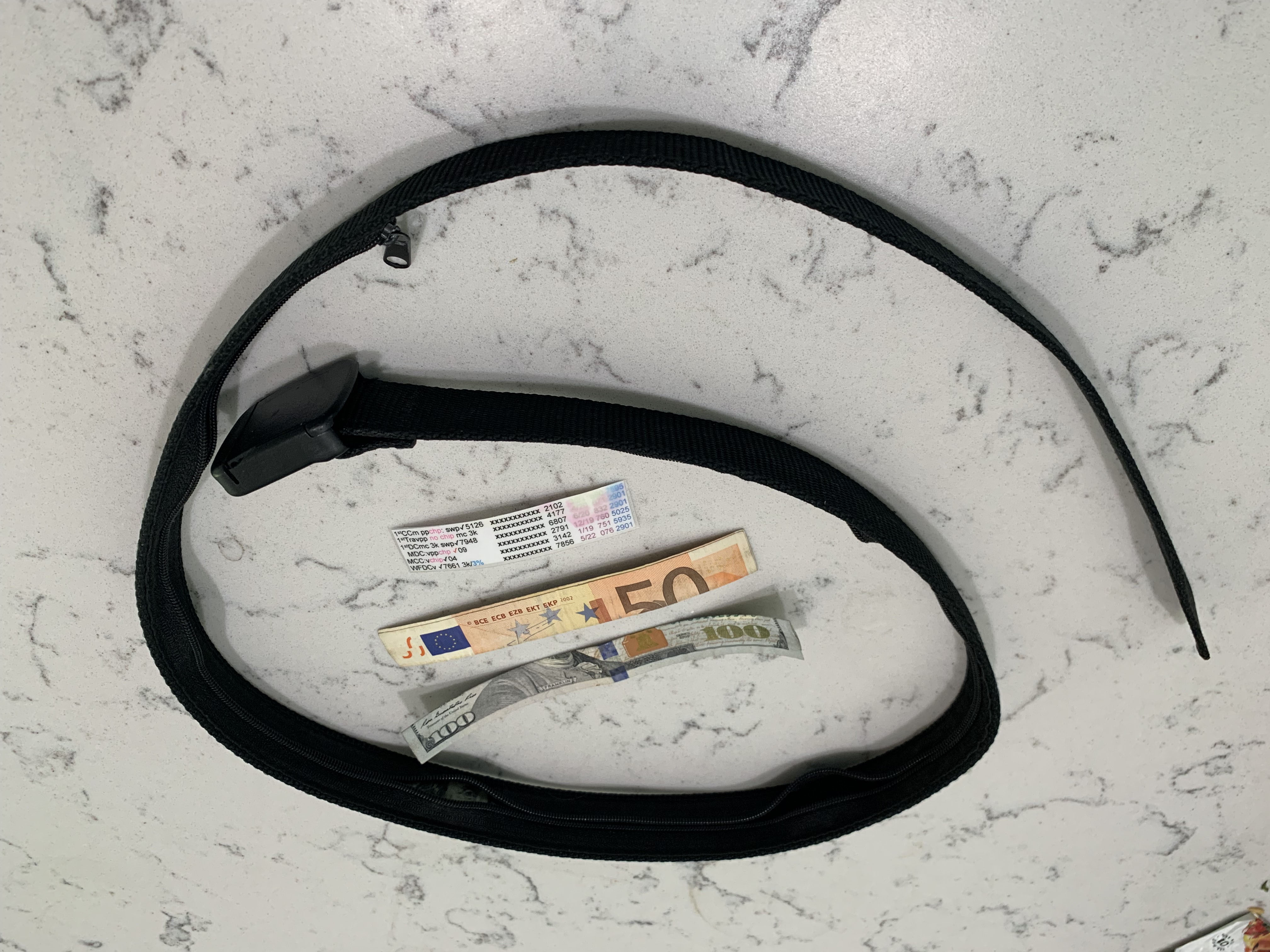
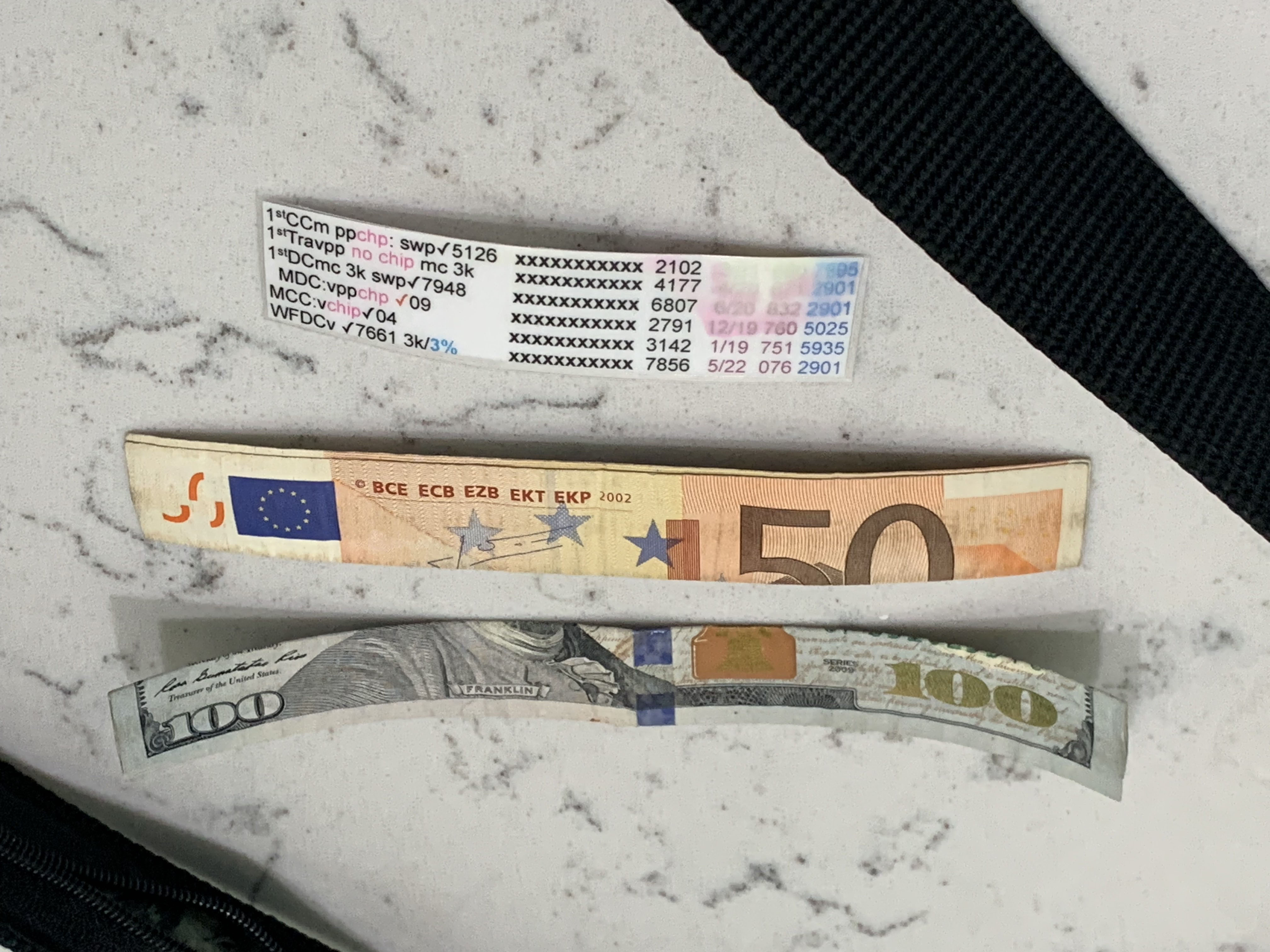
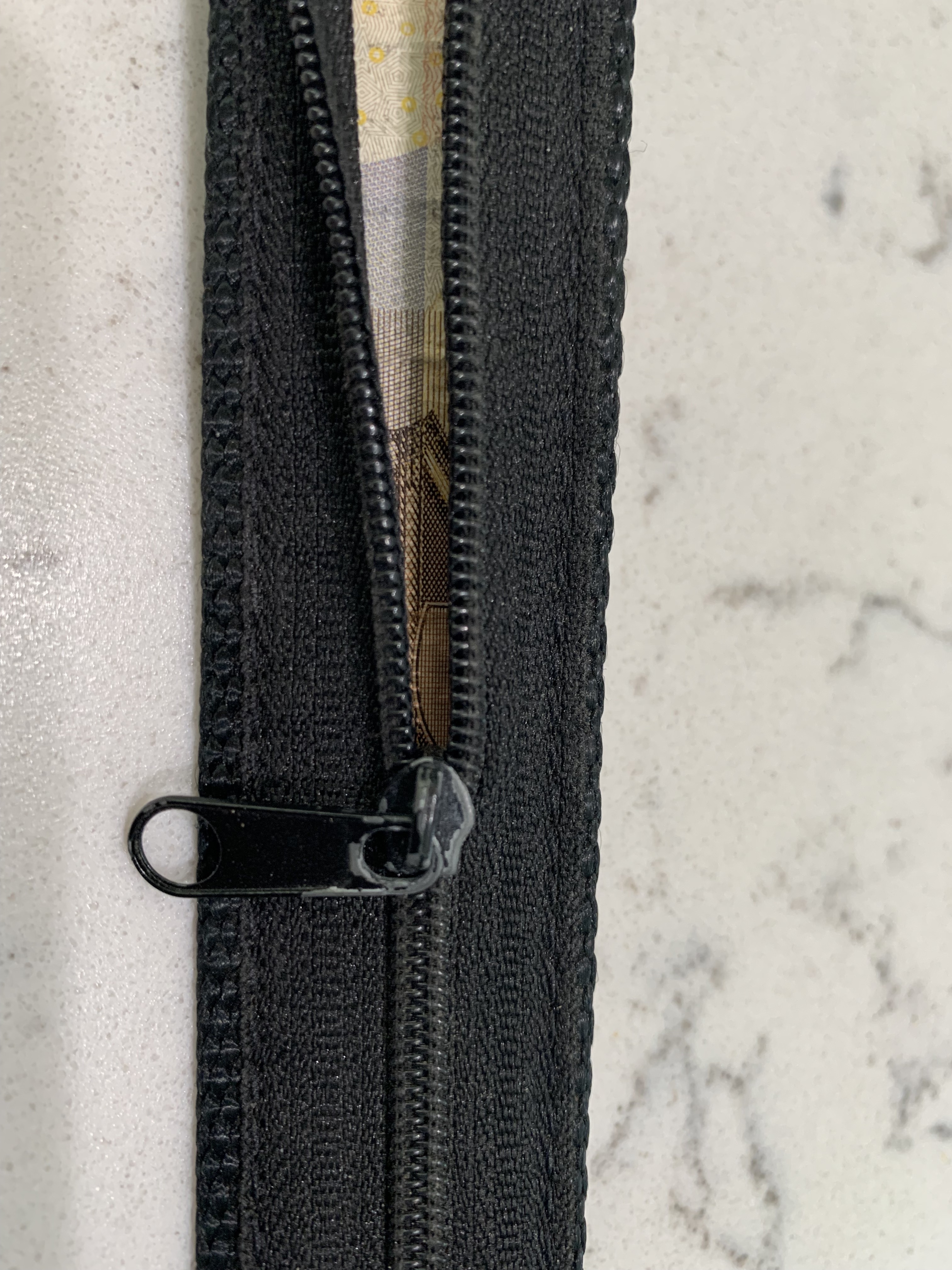
g. Security Travel Pouch w/ Passport, cash & CC/DC:
I have carried Rick Steve’s very early Essential Silk Moneybelt for 20+ years --- with my modifications.

This money belt has a stretchy waist strap with a plastic locking buckle that allows pouch's easy on & off ... if ....you don't want to step thru the waist strap or bring it down over your head which I normally do.
The buckle also allows waist strap to be tightened as it stretches over time.
BUT, I wanted greater security than just buckle. I feared buckle might inadvertently unlock or, more likely, I might not close it properly.
SOLUTION: So, I bridged the plastic buckle by installing top of 1/2 of a stainless snap fitting to 'waist strap free end" & the bottom part of snap fitting to 'pouch strap end' which is attached directly to pouch. This modification provided a redundant strap lock.
I always use this security travel pouch when traveling long distances by air, bus, or rail usually between countries and cities. I do NOT wear it on a daily basis cuz a passport is safer in my hostel, IMO.
Instead, I always carry on my person a paper copy & a cell copy of my passport.
Other travel-related pouches:
There are several styles & designs of such pouches: some specifically for travel, others, apparently, for fashion. Travelers, please avoid the fashion pouches.
They are, IMO, a pickpocket & 'snatch & grabber's ideal target.
Travel-specific pouches promote the security of your valuable passport, money, etc. However, IMO, some travel-styled pouches range from practical & max safety TO potentially dangerous.
For my deeper critique & defense of my above allegations, please SEE: [pplk: post: Wardrobe: travel pouch]
1) [ytlk: security pouch / belt- to come]
h. Socks:
As US Air Force Academy Cadets, our khaki pant's pockets were heavily starched & pressed tightly closed, AND ... kept that way to preserve the trim military look. So, we carried our small ‘necessaries’ (pens, pencils & money) in our socks.
Traveling, I often split my ‘backup” monies into 2 folded sheaves &
slid them down inside each upper sock, facing the opposite leg so the bulge, if any, would not be easily visible, particularly when wearing shorts. Large bills on the left side, small bills on the right.


This micro strategy did not telegraph to onlookers who saw me reach for my smaller bills in my right sock that there was an even greater amount on the left side. (I hoped).
Anecdote: Hanoi open market lunch counter.
After lunch at one of Asia's large enclosed market's lunch counters, I reached down my leg into my sock and pulled out my "decoy cash'.
Looking up I caught the nearby vendor watching me. He started chuckling ... silently applauding my hiding place. We both had a good laugh & a 'human moment.
i. Shoes:
My hiking shoes were well-broken-in, sturdy & comfortable for both walking the streets of a major city or hiking a mountain or jungle trail.
So disgusting were my hiking boots that TSA routinely ignored "my Ancient One's" exemption and inspected my boots anyway.😀
Anecdote: India's Intentionally ugly shoes.
At Asian temples & hostels you must leave your shoes/sandals outside/ or in the entry, respectively. Leaving my $150+ hiking boots unattended surrounded by dozens of $1 sandals, was an obvious risk.
So, I sought to discourage theft by totally marking them up with felt tip pens to make them too ugly to steal. 😀
Removable Support Arch Insert:
Many hiking boots & shoes come with removable supportive arch inserts UNDER WHICH I hide
- in one shoe, several USD $100 emergency bills, tightly wrapped in plastic so sweat, damp, stream crossings, etc will not destroy them. Ironically, I often 'discover' those little paks when buying shoes for the next trip. 😉
- In the other shoe, is a tiny abbreviated summary of my credit/debit card numbers & pins which I could never remember.




PIKs: 1) 2 PIKs of L & R shoe w/ removable insert showing a) $ wrapped in cellophane, b) small CC/DDC. Greater explanation & closer more detailed PIKs reserved for Hidden sub-post.
j. Pickpocket-proof clothing:
I bought several garments from Clothing Arts when they 1st began; high-quality anti-theft pants/shorts worth investigating. https://www.clothingarts.com (clothingarts.com)
There are other companies online.
DISCLAIMER: Again, I have no intent to make money on this blog at this time from any source including Clothing Arts. My blog is solely non-profit educational. If somehow, it makes a profit, I will donate it to charity. 😇
ANECDOTE: bird crap scam
street art, ... if not so annoying & unnerving
“Near Plaza de Armas, Santiago, Chile unbeknownst to me a woman walked up behind me & squirted some fluid on the back of my neck, then immediately started saying “Ave! Ave!” (Bird! Bird!) while enthusiastically cleaning ‘bird dirt’ off the back of my neck.
Then, she smoothly moved in front of me ... to show me the ‘apparently’ soiled handkerchief she was using to clean off my neck.
Everything was happening so fast!
She continued to wipe at this bird’s ‘apparently ‘massive & widespread’ guano bomb while her 'partner' arrived ‘instantly’ to continue clean-up of my back.
Finally, my brain kicked in at some point in this chaos — "All was not well." I wheeled around in time to see the man, who had turned away from me, hiding my money in a travel brochure.
I instantly reached over his shoulder grabbing the entire travel packet as they immediately jumped into a well-timed taxi which swept them quickly away.”
Irony: As I recovered composure & walked away 2 policemen casually continued their rounds toward me …. unaware.”
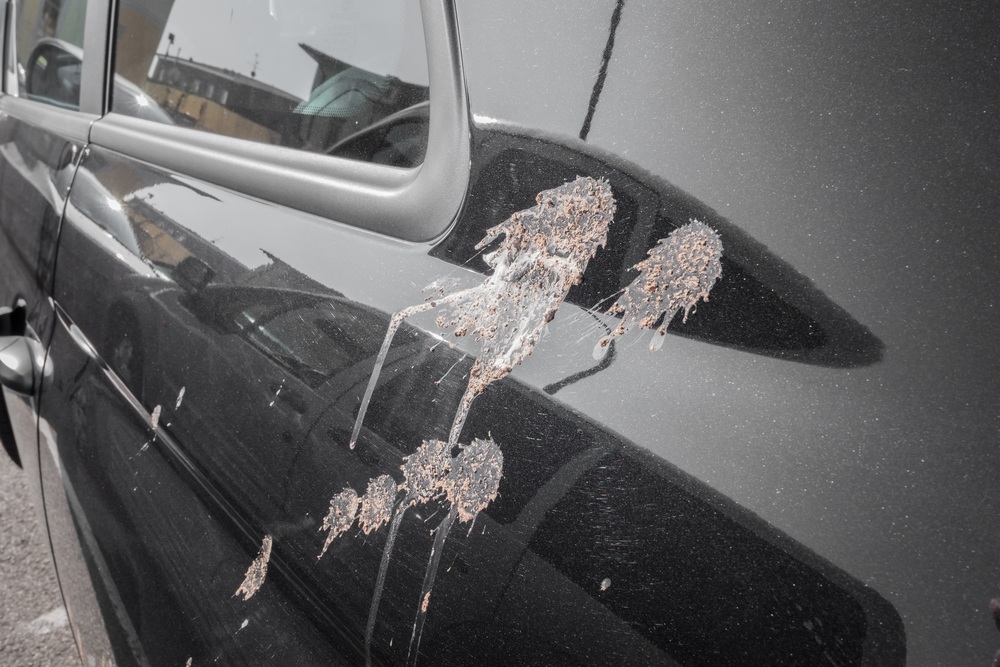
II. THEFT:
A. Snatch & Grab:
DEFINITION: When your shoulder-hung camera or  hand-held purse has been violently & suddenly ripped off you too quickly for you to react as thief furiously bikes off into the distance. … It “Ain’t his 1st rodeo!”
hand-held purse has been violently & suddenly ripped off you too quickly for you to react as thief furiously bikes off into the distance. … It “Ain’t his 1st rodeo!”
OR, your passport pouch’s neck strap, dangling visibly from your neck, is sliced thru with the running thief’s razor knife (you can only hope he doesn’t cut into your carotid artery. (Too scary to justify a neck pouch.)
B. Photo Op Camera Theft
Anecdote: Potential camera theft scam
Scammer asks, “Take your picture, Mister?”
“Yeah, I’d love a picture of me with pyramids in background!”, you quickly
 think, almost automatically starting to hand your expensive cell or camera to the scammer, but instantly remembering this SCAM, you stop and wave the scammer off before they grab your outstretched camera and race into the crowd.
think, almost automatically starting to hand your expensive cell or camera to the scammer, but instantly remembering this SCAM, you stop and wave the scammer off before they grab your outstretched camera and race into the crowd.
Ironically, I often ask other tourists -individuals, couples & families - if they want me to take their photo, they hand me their phone, and I shoot and hand phone back so they can verify they like photo. They are happy and I feel good.
So, how does that work? Why trust me?
I am 1) obviously a foreign Amer-Euro tourist, 2) too old to run fast, 3) expensive video camera in my hand because I am also shooting same scenes, 4) too curiously a dressed foreigner to be a local thief, and finally, and 5) my Anthony Hopkins-like face. (yes, my mini-ego trip😀)
C. Hostel LODGING:
.... avoid ground floor or next to the stairs
AND lock all doors & windows, if practical.
I never thought of or noticed this issue, but context may be everything! Rough area big city vs bungalow  in Thai mountain village; good hostel security vs not.
in Thai mountain village; good hostel security vs not.
Wide range of hostel’s entry & room security, yet I recall no issues.
The variety of lodgings - hotels, B&Bs, hostels, etc security levels vary widely. B&Bs may be in tightly controlled safe home-like contexts, while hostels have near-infinite structural & security forms.
Some hostels are new specially designed for security with a tightly
monitored lobby & upper-floor room access including computer cards for all floor levels & rooms. Others may be make-shift, converted hotel rooms with near zero security beyond an old door lock.
Some hostels are accessible directly from the street, while
others require a stair-climb or elevator.
A hard fast rule is often not possible. Or practical …
Finally, you may have to take the room or bed you can get .... as worldwide travel increases along with hostile usage. OTOH, online hostel info & PIKs can help select the most secure hostel.
Early on, I often booked a room when I arrived at the hostel or on the bus or train en route to. Availability was excellent. The longer I traveled the more necessary were pre-booked beds or rooms.
Depending upon season you may not want the windows closed.
Anecdote:- TIP: Camino de Santiago
When walking the Camino De Santiago across Spain during the hot season I always tried to arrive early so I could choose a bed next to a window. This strategy allowed the 1) possibility of nighttime cool breezes, & 2) close enough to "control" window's open & closing. Believe it or not some people don't mind sleeping in a hot, breath-moist room tightly packed with people.
Ironically, in equally super-hot Alice Springs, Australia hostel w/ AC, and my roommates DID NOT want the A/C on. Go figure. Get a single room.
National Crime Scene Cleanup: “Common Hotel Crimes You Should Know For Your Safety and Security” https://www.crimescenecleanup.com/hotel-motel-crimes/
Safe Practices: bird crap on neck scam
see these kinds of scams coming, .... or not.
1. Carrying Money:
 NEVER carry anything of value in pockets particularly rear pockets except your ‘decoy' cash --- discussed above.
NEVER carry anything of value in pockets particularly rear pockets except your ‘decoy' cash --- discussed above.
2. Always be aware of your surroundings:
This is probably silly advice because you are focused on what is usually a 99% worry-free travel experience. You are not constantly focused on lurking pickpockets.
In contrast, 99% of a pickpocket’s skills & concentration are focused on stealing your valuables.
The contest ain't equal, BUT you can try….😀.
3. Prepare.
a. Read up on typical scams so you are pre-aware and more likely to see them developing; recognizing their potential.
b. Again, see my. Pickpockets:
4. Hide Money & cell:
Over 20 yrs of travel I developed places to hide varying amounts of cash on my person so that if pick'd or robbed I could visibly fake fear (like I need to fake), hand over my money, then with thieves gone … walk around the next corner and pull out some more money.
Please read on to "Hidden Money". ----- next
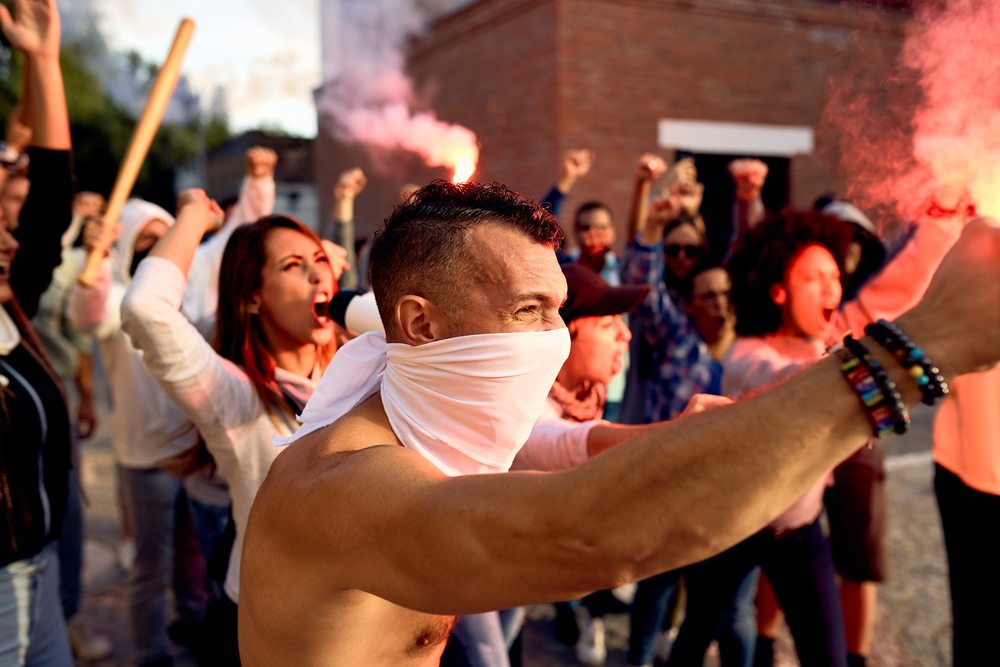
III. Retailers:
A. GENERAL: shops & stalls
The honesty of retailers toward their customers worldwide at all levels is, IMO, directly related to the trust of their customers.
Small rural retailers & their customers know each of well; may well have grown up together. While limited retail options the rural customer has learned to  trust their retailer’s consistent quality & price, or they will seek alternatives.
trust their retailer’s consistent quality & price, or they will seek alternatives.
The huge open market ‘stall’ retailers of the world also must curry the trust of its frequent customers because of numerous competitive nearby stalls selling the same items.
Both retailer & customer must be or become skilled at researching & comparing the quality, availability & price of each specific product (tomatoes, shrimp, etc.) not only over time but day to day.
Both retailer & customer have skilled, well-practiced age old bargaining skills to employ when required. Sophisticated consumerism at its best.
Ironically, the large US supermarket chain stores of the US have a similar, but more antiseptic, relationship with customers who can tailor their shopping to the best opportunities each store may offer. EX: I continuously shop all 3 supermarkets in Jackson Hole, WY for different items at predictably different prices & quality.
B. Tourist Customer:
Unfortunately, this retailer/customer trust relationship MAY break down when a foreign tourist is added to the mix. The ‘obvious tourist’ heralds a ‘once in a lifetime visit’ usually driven by curiosity rather than a serious need or desire to buy.
Depending on the retailer’s product line the retailer may view the ‘obvious tourist’ at BEST, as a “wonderful opportunity’ or ‘mana from heaven.’ At worst, the tourist may be seen as an annoyance interfering with or distracting regular, legitimate customers ….. UNLESS the tourist shows legit interest in buying.
While most retailers operate honestly, for some it is difficult, not to take advantage of naïve,  inexperienced, unskilled overly excited relatively wealthy tourists. Tour bus-frequented tourist shops or markets almost by definition are predictably far more expensive than more local-based retailers.
inexperienced, unskilled overly excited relatively wealthy tourists. Tour bus-frequented tourist shops or markets almost by definition are predictably far more expensive than more local-based retailers.
These retailers know you are more or less a captive audience, traveling fast, and having little opportunity on your own to explore similar shop’s availability, quality & price.
Often such shops /markets exist primarily to satisfy the tourist’s compulsion to take souvenirs  back home to loved ones or brag about a foreign purchase (EX: Thailand hand-tailored silk suit.).
back home to loved ones or brag about a foreign purchase (EX: Thailand hand-tailored silk suit.).
There may be a higher price for tourists, quality may be dubious at best, and money exchange cheating.
A tourist has NO knowledge of the reasonable local ‘price, or quality’ and lacks any bargaining skills. Knowing this, the retailer ‘sells’ the price he thinks “ the market will bear” mindset ... taking advantage of tourists’ ignorance & lack of skills.
Anecdote: returned $ change
Chilean dessert small road-stop clerk returning my overpay. Japan, Tokyo waitress running down street.
CAUTION: don't 'pretend' to be a legitimate customer just for fun. It is, IMO, unethical ‘toying’ with a person's livelihood and his family's well-being.
OTOH, the 'obvious tourist' faces several' risks: 1) price gouging,
2) ‘thumb on the scales”, 
3) poor or counterfeit quality, ‘knock off’ goods, 4) incorrect transaction change, and others.
If a tourist shows legit interest in buying — game on. Here in lies the danger and the opportunity for the tour
Small shops (rural, vs tourist) vs open market stalls.
C. My Shopping Practices:
I have a fascination with huge open markets, particularly of Asia …searching them out. I love to wander thru these markets, particularly in Asia: a cacophony of vendor’s shouts, a mix of smells, animal noises & seller’s loud hawking.

While most tour groups are kept quickly moving past the open market’s perimeter to stay on its schedule, I, often visit in the early morning.
I purposely probe deep into the market’s deepest guts --- literally -- thru the meat and fish department’s melange of butchered flesh & a stench of innumerable dried fish.
I’m dazzled by the variety of foods offered, bewildered by an item’s massive duplication among vendors at seemingly inexpensive prices. A rousing assault on all the senses, in contrast to, for example, shopping in a sedate, plastic-wrap sculpted American supermarket.
Most large foreign open markets are a large mix of everything locals might need from groceries to housewares offered at seemingly endless vendor stalls often selling  the same items.
the same items.
[ytlk: CHI: Xi'an Muslim MKT: Proj 021 OR Guilin: Proj 085 OR Lijiang Proj 121 ]
A seller’s market stall may have been in their family selling to the same local families for generations. Their consistent quality, fair pricing, & honest dealings have created a trusted reputation.
In my experience, most storekeepers & market stall sellers that I have encountered seemed honest and very hard-working.
Their livelihood is based on their quality & prices and the mutual trust they create. However, these markets also serve tourists ranging from solo travelers like myself to large tour groups.
ANECDOTE: Chile shop returns $
honesty decreases high in retail's food chain(?)
Anecdote 1: Chilean small shop returns cash overpay
On a 4 day, small van, overnight tour passing thru Chile's north central high desert region, we made a brief rest stop at a tiny roadhouse. I bought a small authentic tourist geegaw for a friend's daughter. [LINK: image].
But, apparently, I gave the clerk too much money because after I had walked away, she rushed up to me in a panic handing me my 'overpayment' change.
I ‘thanked’ her profusely because I was so surprised that someone living a bare existence lifestyle in a poor country would be so honest. In a big city, I am reasonably confident this ‘tourist’ would never know he had overpaid. I was ashamed of my own cynicism.
Anecdote 2: Tour promoted retailers & kickbacks:
However, specific businesses & markets may corral foreign tourists intentionally delivered by tour companies usually in return for some kind of kickback to your guide.
Safe Practice:
In Saigon I purposely let my tuk-tuk driver take me to a silk tailor shop -- just for the experience. The retailer was courteous without undue pressure and I left with nothing but its memory.
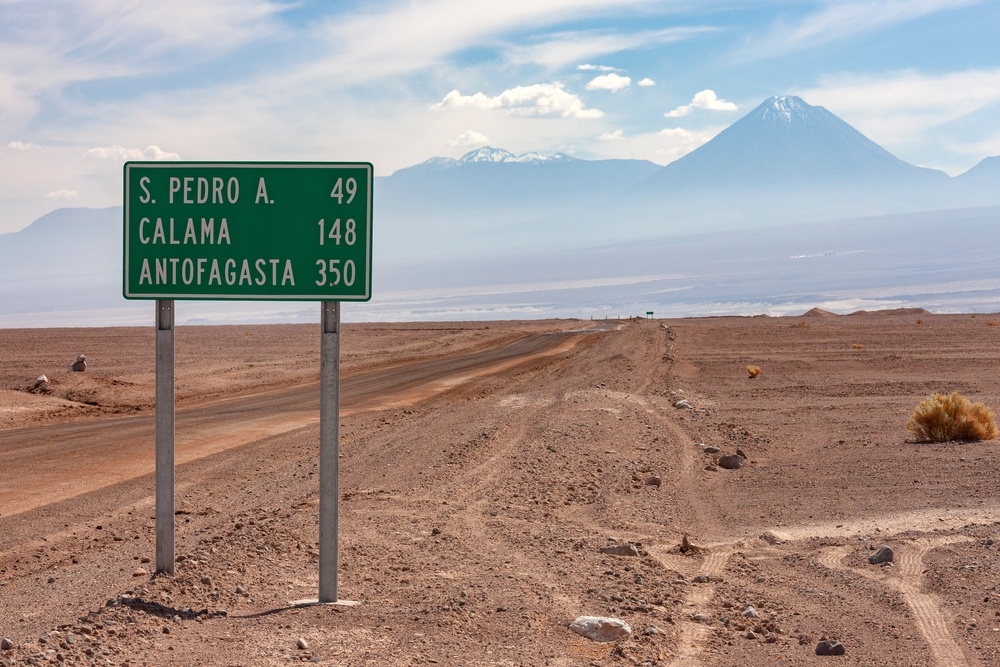
ANECDOTE: Tailor shop visit
Tour promoted retailers & kickbacks
However, specific businesses & markets may serve foreign tourists intentionally delivered by tour companies usually in return for some kind of kickback. In a Vietnam tailor shop your guide may get a direct kickback on whatever you buy.
In Saigon I purposely let my tuk-tuk driver take me to a silk tailor shop just for the experience. The experience was courteous without undue pressure and I left with nothing but its memory.

ANECDOTE: Embarrassment extortion
rare & boldly rude
CONCEPT: a tourist stall seller enthusiastically places her merchandise - a bracelet, scarf etc- on you to presumably see how you like it.
But when you reject BUYING it, -- princess turns witch --, loudly & indignantly yelling to all the
nearby world that you are trying to renege on a deal you NEVER made. Apparently, the embarrassed, intimidated tourist buys. Nasty street theater.
TIP: This scam may also be a setup for theft. While you are preoccupied with the vendor, their pickpocket accomplice searches your pockets or swipes any easily accessible valuables.

SAFE PRACTICES
Don't be intimidated! Turn the tables......
1) Don’t let anyone put anything on you. Forcibly, if necessary, karate 'slap' their hand away.
2) Laugh loudly, while handing it back, THUS making an even bigger scene warning others away from vendor. Turn the tables.
3) TIP: Beware of scam seller’s possible distraction setting up her pickpocket accomplice.
D. Bargaining Game:
an age-old tradition, both fun & practical
In the United States, I get annoyed when a shopkeeper does not put a price on an item I'm
interested in.
Most Americans expect items to be priced so we can quickly decide if it is worth buying.
We presume Best Buy’s television's price is firm. If their price is too high, we skip it and buy it later from a different seller.
Interestingly, most foreign large market stalls & grocery stores have  started to adopt this ‘marked pricing’ model,particularly for common fungible items like tomatoes, bread, etc because both retailers & consumers don’t have time to waste over ordinary purchases. Rapid turnover trumps wasted time.
started to adopt this ‘marked pricing’ model,particularly for common fungible items like tomatoes, bread, etc because both retailers & consumers don’t have time to waste over ordinary purchases. Rapid turnover trumps wasted time.
However, in many other cultures, their shops & markets still practice bargaining — buyer & seller negotiation — particularly when items are scarce, unique (art), or inherently expensive (jewelry.) 
The human economy for eons established all prices thru barter’s bargaining negotiation based on an array of subtle supply & demand factors between willing buyers & sellers.
Bargaining sets a sales price between seller & buyer at a moment in time. Both sides can seek out an agreed price based on market factors: Holiday chicken demand? Chicken price last week vs today? The current supply of chickens? Too few! — high price, too many! — low price.
Believe it or not, this simple, yet subtle ‘bargaining ‘ concept underlies all businesses including the European stock market & local China’s Lijiashan village grocery prices. It can be extremely subtle & complex.
Local shoppers of these traditional markets have the background knowledge, experience & traditional bargaining skills to easily & competently match those of the sellers.
Unfortunately, the foreign tourist does not have the local’s bargaining knowledge, experience & skills, yet must gain them quickly or be exploited.
Devoid of these skills & knowledge most ‘obvious tourists’ quiver in anticipation of their purchase … flushed with  bargaining confusion like a rabbit trapped by a fox.
bargaining confusion like a rabbit trapped by a fox.
In shops & markets frequented by souvenir-seeking tourists often led there by their guides, you are definitely prey to price gouging & all other tricks seller’s can employ including lurking pickpockets.
But, in all fairness, remember, ‘bargaining’ is their tradition. It is your naïve ignorance that places you at risk. Let’s look closer.
I hope to teach you basic bargaining attitude, strategies & tactics.
E. Bargaining Rules, Tactics & Strategies:
Bargaining can be fun, but I have a few simple rules and tactics I follow, and hope you will.
1. Ethical Rule:
Never bargain for fun, only if you .. actually, … seriously … are considering a purchase. If you  can’t reach a bargained price agreement, then you are, of course, free to walk away.
can’t reach a bargained price agreement, then you are, of course, free to walk away.
If you are in the research stage of bargaining, you have no obligation to buy until you can compare other retailers’ options.
BUT don’t mock a vendor’s livelihood or waste her time without ethical purpose. They have a family to feed.
2. Vendor Accepts:
If a merchant accepts your offered price, the tourist MUST buy or be seen as “dishonorable & of bad faith”, if they do NOT buy.
Even the American Uniform Commercial Code enforces this ethic. Only “The Ugly” American would defile this basic business ethic.
3. Vendor's Ethics:
IMO, if you don’t counter-offer and just buy at the vendor’s price that seller is not unethical, rather, .... you are naïve, lack bargaining skills or are not concerned about price.
If naïve & lacking, it is you who have violated the bargaining tradition and paid the high price … literally.
Afterward, don’t denigrate a retailer’s pricing, etc because of your ignorance. That is not fair.
A solo traveler’s bargaining adventure of acquiring knowledge & skills can be fun and satisfying, giving you a sense of being part of the culture.
Synopsis of Usual Bargaining Process:
1) You arrive at seller's stall & start looking,
2) a skilled seller recognizes you as a tourist, ’sizes-up’ your desire level, bargaining sophistication &, believe it or not, attitude,
3) You enquire about the price,
4) the seller offers an outrageously high price,
5) you counter and 6) offered & counter-offer until you 1) politely walk away, 2) seller gets tired of unproductive gain, or 3) a deal is reached. That's it.
F. My Strategy & tactics:
1. Research:
a) If merely curious, I fondle the item with zero facial expression and ask the price. Putting it respectfully back in place I walk off respectfully dismissing, but mentally noting, retailer’s offers of a better price.
If interested in an item I do the same as above inquiring about the price, BUT THEN I probe the seller’s willingness to lower price with a little back & forth.
Then, I smile, nod my ‘Thanks’ and respectfully, walk away, but may hesitantly be drawn back to bargain further if seller is insistent.
Finally, if still not ‘convinced’ I respectfully walk off … apparently for good.
NOTE: I use the word “respectfully” often because legitimate authentic ethical bargaining is important and serious business; a family's livelihood and well-being lie in the balance.
Never use disrespectful theatrics to attempt to intimidate a retailer or improve your position. Always be respectful regardless of how you choose to ‘act out this play.’
b) Then, I hit a couple of other shops or stalls for the same item and work thru the same routine looking for the quality/quantity/price differences.
c) Finally, I revisit the shop that had the best price and bargain some more until I buy. We both know I am probably going to buy it.
2. PRICING:
In sum, I want the best price, but I also know that a retailer has a price she CANNOT go below; a price that includes the minimal profit she can accept or her investment in labor, time & materials will have been wasted.
Depending on the bargaining skills of both tourist & seller, the barga ined price should ultimately be a win-win for both.
ined price should ultimately be a win-win for both.
CAUTION: You are NOT a hero if you beat up a person in a weaker position.
ANECDOTE: Papaya seller - mea culpa
... bullying a weaker person is immoral.
In the Guatemalan toolies on a day trip, our small van tour stopped at a countryside gas station and I bargained with a village woman for a plastic baggie of sliced papaya.
I bargained ruthlessly until I got the price well below what I thought was fair. I was so pleased with myself until … later when my greedy, ego-driven guilt of a ‘victory’ over a simple villager washed over me. Real cheap shot, Scott. Guilt still plagues me.
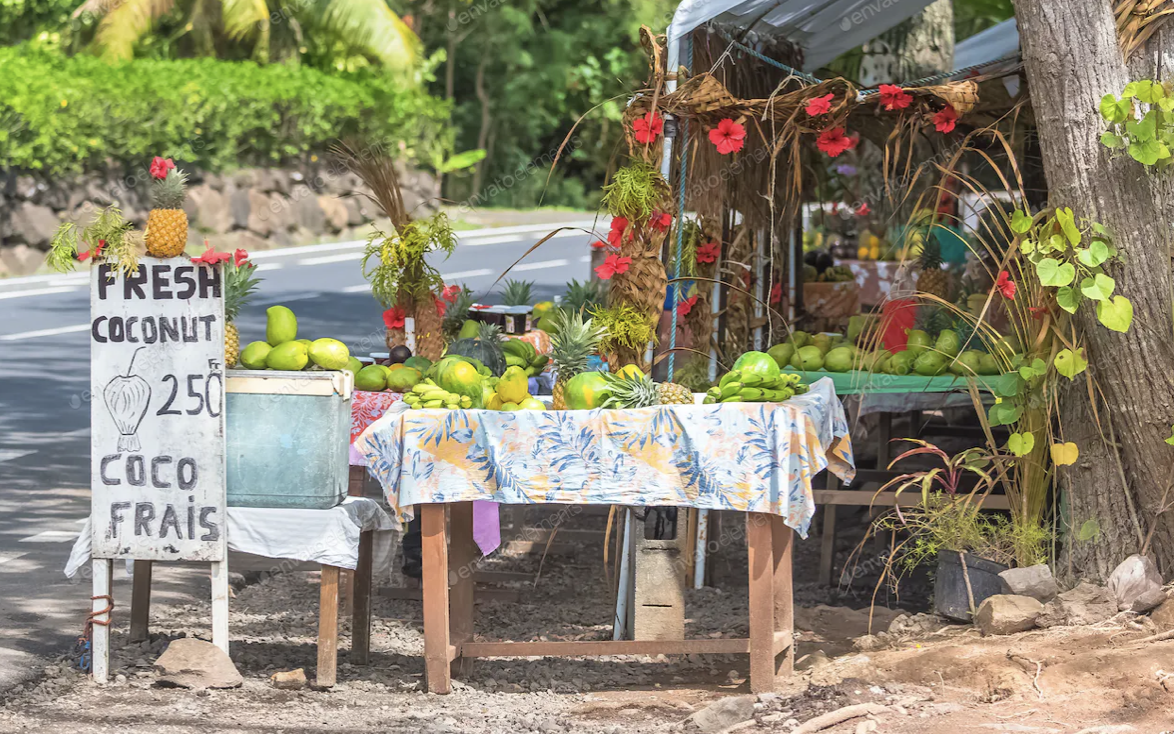
3. Risks & Scams:
neutralize & avoid risks with fore-knowledge.
OTOH, be careful not to pay dramatically more for a good or service just because you can. That just ratchets up their future tourist price until tourists stop buying altogether — a false & damaging inflation.
a. Over paying for poor quality &/or an exorbitant price:
Little risk on a bag of tomatoes you have chosen from the bin, but what about an expensive, allegedly high quality ‘hand tailored 3-piece silk suit when your expertise is marginal & your ability to ‘evaluate’ price even worse? You are ‘going to the cleaners’ long before your suit does.
b. “Thumb on the scales”:
Certainly, a seller could literally & surreptitiously put her ‘finger-on the-scales’ and cheat you  out of a few pennies on a small bag of tomatoes or fresh peas.
out of a few pennies on a small bag of tomatoes or fresh peas.
But why challenge a seller & her antique scale the family may have been using for 50 years over a few US pennies? Let the game play on.
c. Lack of skill & practice spawns 'buyer's confusion.
4. Want to play game?
Safe Practice:
Don’t let your bargaining paranoia and perhaps cynicism override your respect for seller’s honesty. Bargaining is a sophisticated, traditional skill-set in which both parties are presumed to be equally qualified.
The following is a combination of my Safe Practices bolstered by Rick Steves’ bargaining advice.
a. My MOST IMPORTANT TIP: “Buy something!”
Immediately after entering a market, find anything to buy — a bunch of tomatoes, peas etc — that a vendor can/will put in a plastic bag so it is obvious you actually bought something.
NOW, you have instant credibility, you are a real buying shopper — not just a Looky Lou ’tire kicker’.
b. Know & practice your Currency Conversion:
Mentally practice converting local large & small prices into equivalent US dollars while you are shopping. Make this a habit.
My biggest problem is my inability to quickly do this until I have been in-country for a week or more. How much is ½ doz Romanian eggs in USDs.
c. Determine item’s quality:
Everything has a 'quality' based on its characteristics.
Is a garment “Fully Hand Stitched” vs lower quality “Half Hand Stitched” or “Machine Stitched?” Are tomatoes firm red? Are DVDs pirated?
d. Local’s price:
Watch what & where locals buy & their price paid, particularly for expensive stuff -- like Mexican serapis etc. If seller sees you observing locals, then she knows you know. Harder to overprice.
e. Most important, your plastic bag of tomatoes,
Your, preferably, clear plastic bag of veggies & your close inspection & observation of vendor's customers & goods will reflect your commitment to buy which vendor WILL notice & respect.
Now, just for fun imagine your reception, if you returned again. Your credibility as a ‘buying tourist’ has jumped amongst all sellers and you’ll sense it with a subtle nod of recognition, a hello or specific attention to your questions.
This is not duplicitous manipulation on your part, All over the world business operates on this customer/ seller relationship.
A remarkable system considering in the United States we buy whatever Roma tomatoes are priced at or we must drive to the next supermarket. Here you just shuffle between stalls.
Now to go deeper, let’s do what I often did in my travels: rely on Rick Steves advice.
How to Haggle: Tips for Bargaining Overseas by Rick Steves: https://www.ricksteves.com/travel-tips/money/how-to-haggle
- Determine if bargaining is appropriate.
- Shop (other shops & market stalls] to find out what locals pay.
- Determine what the item is worth to you.
- Determine the merchant's lowest price.
- [Ask merchant]
- [Observe what local’s are paying for what you want to buy. Then you know and the seller knows you know
- Curb your enthusiasm.
- Employ a third person. ??? (Don’t understand)
- Impress the merchant with your knowledge.[quality, competitive prices, availability]
- Ask for a deal on multiple items.
- Offer to pay cash at stalls that take credit cards.
- Obey the rules. If a merchant accepts your price (or vice versa), you must buy the item.
- If the price is too much, always be prepared to walk away.
IV. Touts: annoyance & distraction
A. What is a 'tout.?
A tout is a person or group of persons pestering you to buy something … typically by pestering you in a persistent, sometimes aggressively bold manner.
They are often dirt poor, desperately trying to feed their families while others may be modestly affluent trying to promote their hotel, hostel, restaurant or tour services.
The tout’s definition of a foreign tourist is … “a walking ATM machine” with an unimagined $ balance — wealthy. The tout may be awed by your airfare & travel budget, not to mention your vacation time to travel. Wealthy foreigner! Indeed!!
Tout engagement strategies:
1) Desperately pushing their goods right in your face
2) Shoving their wares thru your bus window before you exit or on your return entry,
3) Attention-getting words: Hey Mister? Where are you from? Nice hat? You want a girl? Help me practice my English? Nice hat, mister. LOL
"Most Annoyng ...." BP Ben: https://www.youtube.com/watch?v=I2YwRXSqG84 @ 5:57 timeline.
4) Touts may walk train aisles between stops: normally selling home-prepared local food or fruits. Walking quickly past as many potential customers as possible (a service rather than an annoyance)
5) Informal site guide approaching casually,
Usually, the poorest of the poor are touting cheap, yet perhaps authentic ‘remote hill country’ tourist gewgaws frequently made in a hill tribe home.
Their simple strategy is -- relentlessly pester you more than their competitors do … until you buy something or there is no hope or a better target emerges.
Touts also include more experienced, prepared & sophisticated peddlers.
ANECDOTE: Mex kid selling gum
in some countries, everyone works constantly
On a 3 month RV van trip thru Mexico, Guatemala & Belize young boys & girls almost everywhere tourists might be, were selling 2-pak Chiclet gum for a few pesos. Entrepreneurial at a most basic level.
The few pennies profit they may make/day helps feed their family. Chiclets Boy may well develop the initiative & imagination to expand his horizons & profits someday.
At the Cuidad Hildago, Mexico/Guatemala crossing, a boy proactively started washing my van while I was inside processing paperwork. I rushed out & asked him NOT to wash my van.
Instead, I gave him more pesos than he was asking for to ‘guard’ my van. I did not want my van to look clean & flashy suggesting it carried valuables inside.
In contrast, here in Tucson, AZ some all-age people, seemingly in good enough health, populate the freeway off-ramps with illegible, handwritten signs simply “begging.”
A lifestyle choice, IMO, rather than a sympathy garnering societal tragedy.
Nasty side of issue: MEXICO: STREET CHILDREN OF MEXICO CITY: https://www.youtube.com/watch?v=ugI7wvYXcKE

SAFE PRACTICES
reward initiative ...
1) If you don’t want your windows or car washed, give tout something small to do, like clean the headlights & then give them some pesos — puny cost to you, but crucial to them.
2) More clever ones selling tourist-related stuff: better English, more clever attention phrases. ( “I like your hat.” “Hello, Mr.”) Do what pleases you: buy or don’t. CAUTION: Once you buy from one, you will be mobbed by ALL.

Risks & Scams Where & how
B. Where are touts?
Like grizzly bears touts are where they find you.
Usually at tourist sites, outside restaurants & businesses, on long-distance trains or at long-distance bus stops, or on busy commercial streets where locals & tourists congregate.
They will verbally try to engage you with questions that prompt you to stop so they can sell you something. American/European courtesy almost demands that you stop & courteously reply to: —- 1) Hello Sir?, 2) Where are you from Mister?, 3) Nice hat?, 4) Will you help me practice my English? 4) “Mister, you want girl? ,— maybe not so much.
In Asia, locals selling local food, drinks & food may get on a long-distance train when it stops, walk the train aisles to next stop, jump off, & take next train back. Not really aggressive touts; just providing a service really. Unfortunately, I avoid such local’s food for health reasons.
C. How touts select you?
As we discussed earlier, it is very hard for a foreigner to go unnoticed because of our unique appearance & behavior, particularly when arriving or departing a major tourist site in a giant tour bus.
D. What Tout behaviors?
Touts' greatest characteristic is their desperate attempt to harass you into buying or doing something you must pay for. Their desperation is so intense that they are totally uninhibited in their benign assault.
Remember, to a tout, you are walking ATM machines, with few protective connections, unlike their wealthy countrymen who may not tolerate such rude intrusions.
E. Touts fleecing tourists?
An article I reference below asks, “If touts are fleecing tourists or just making a living?” What a foolish question, particularly the subjectively pejorative word — “fleecing”.
Fleecing implies dishonestly charging too much. What is too much? Covid’s high-priced toilet paper? Russian/Ukraine debacle’s high gas prices? Car dealerships? Cosmetics company’s dubious illusory wares?
Are Touts fleecing tourists or making a living? The Globe & Mail: https://www.theglobeandmail.com/life/summer-living/are-touts-fleecing-tourists-or-making-a-living/article13016217/.
Prices are based on ‘supply & demand.’ Assuming an unlimited supply of tout’s goods, it is the buyer who determines value based on their knowledge & desire. Become knowledgable!!
F. What, you want to buy?
Price & quality: Unless the price is very low and authenticity is evident (rustic, handmade look), you’ll invariably pay less in town, OTOH, to help feed a family.
Beware: Buy from 1 tout, get mobbed by the rest.
Supply & demand: do your research (LINK above to Markets)
Guatemalan baggie fruit sellers: your purchase may mean someone eats today, yet the constant redundant pressure to buy is distracting & annoying.
G. Range of Desperate to Aggressive Touts:
Touts range from the mildly persistent trying to hustle you into a shop or restaurant TO the desperate woman in a mob trying to out-compete for a few pennies to feed her kids TO the ‘almost’ physically aggressive:
ANECDOTE: Desperate to Aggressive Touts
Touts range from the mildly persistent trying to hustle you into a shop or restaurant TO the desperate woman in a mob trying to out-compete for a few pennies to feed her kids TO the ‘almost’ physically aggressive:
ANECDOTE A: (Desperate) mob of woman touts
Outside UNESCO’s Borobudur Temple, world’s largest Buddhist temple, in Central Java, Indonesia, a frantic pack of 10-15 running women literally engulf our arriving tour bus pushing their cheap wares thru my open window or into my face, ‘dogging’ us in a mosquito-like cloud as we attempt to disembark & follow our guide across the parking lot into the guard protected temple.
Initially, you think, “Aaaa. I must be Brad Pitt to these people.”, but quickly you discover you are only an ATM to pitifully poor mothers & wives. Sometimes your guide drives them away …. UNLESS a foolish tourist engages them.
These touts seem aggressive only because their frenzied numbers is unnerving, but probably no worse than Thanksgiving’s crushing worldwide Black Friday shopping stampede.
Please remember these people are scrambling desperately to feed their families.
ANECDOTE: (friendly) restaurant row’s sidewalk touts
Restaurant row competition for patrons in tourist areas can be intense so many restaurants, employ sidewalk touts to induce passing tourists to shop or eat.
Most are, in a friendly manner, trying to induce you into their restaurant by praising their great menu choices.
Anecdote 1: Santiago, Chile’s restaurant row
Isidora Goyenechea Street, Santiago, Chile’s restaurant row, have almost theatrically pleasant touts trying to induce you to eat there.
... BUT,
Anecdote 2: (VERY aggressive) restaurant tout
In Split, Croatia, a crowded tourist area’s restaurant tout so aggressively got in my face that I forcefully shoved him away.
Aggressive Restaurant Tout Tenerife: fudgeywudgeydooda:
https://www.youtube.com/watch?v=mc2naov1Kks

ANECDOTE: Very aggressive tout
On Varanasi, India’s ‘corpse-burning-ghat’ waterfront alongside the Ganges River, aggressive touts try to almost force you to take a boat ride.
One such young man ran closely alongside me ‘demanding’ I go on a boat ride. I completely ignored him until he spun directly in front of me, slowing down to slow me down AND THEN, abruptly stopping believing that I would also stop.
This tactic is truly aggressive & rude in any culture.
Having trained myself to be fully prepared to crash into him, I did NOT stop AND ran directly & forcefully into him forcing him to stumble backward & out of my way. I continued on without looking back.
Not the first time I've encountered that tactic … colliding with only a few —happily. Usually, they're quick enough to jump out of the way.
???

SAFE PRACTICES
1) Absolutely, do not engage!!! totally ignore them: do not look at or speak to, just keep walking on with a neutral facial expression--- do NOT engage.
2) If they touch you or your clothes, sharply slap their hand away,
3) Don’t stop walking.
4) If they block your path, don’t slow down, drive straight into them -- they’ll move, ...or not😀.

ANECDOTE: VERY, VERY agressive motorcycle tout
very rare!
On a beautiful morning’s long walk down a remote road between temples outside Khajuraho, India, a motorcycle taxi driver stopped & asked if I wanted a ride. I replied politely, "No Thanks."
Over next 10 minutes he kept demanding I ride with him. My several ‘no’ responses ranged from pleasant to ‘pissed.’
He kept demanding, revving his engine & blowing his horn so I could not ignore him.
Finally, I walked over & yelled in my stentorian voice “No!” & gave his front motorcycle tire a powerful kick that jarred him into leaving.
Fortunately, Indians are not very large and imposing, not that I wasn’t at risk.
This was strange behavior, indeed, in gentle Buddhist/Hindu India.
???

~~~~~~~~~~~~~~~~~~
ANECDOTE: Useful Touts
endless scam list, so think like a scammer
ANECDOTE A: Hotel/hostel/room touts
Particularly, at small train & bus stations lodging touts promote their small, local hotels/hostels/rooms. Seldom pushy, just providing the option.
Anecdote: train & bus station lodging touts
At small Batopilas, Mexico’s village bus stop at the bottom of Barranca de Cobre (Copper Canyon), an older woman offered me a small room in her home for several days for much less than the few expensive tourist hotels nearby.
As an apartment owner myself, I applaud smart, simple entrepreneurship.
ANECDOTE B: Airport taxi drivers find me good lodging.
Several airport or bus station taxi/tuk-tuk drivers spent an extra hour showing me lodging options based on my requirements.
Of, course they get a commission from lodging, but that’s only fair.
Anecdote 1: Siem Reap taxi driver from airport
When I exited Cambodia’s Siem Reap Airport terminal, I was immediately approached by a calm, affable & articulate taxi driver who negotiated a fair price into town.
En route, he asked if I had a hotel room. “Not yet”, I said, although I had my research list. We discussed what I wanted: location in town center, nice clean room at good price. He offered to show me several until I found one I liked.
1st place was great & I happily stayed for several days … & he got, I am sure, a good kickback from my hotel – – – which he was entitled to.
During my stay, I hired him twice more:
1st for a Day Hire to ‘drive & wait’ temple hop of several different temple complexes around Angkor Wat.
2nd, a 2nd Day Hire trip to Banteay Srei & Beng Mealea Temple complexes 40 miles NE of Siem Reap.
NOTE: When I hire a taxi/tuk tuk etc for a ‘drive & wait’ trip of several hours I either invite him to lunch with me or I buy him lunch.
Anecdote 2: Iguazu Falls, Brazil-side’s visit
An Iguazu Falls, Argentina hostel clerk’s friend with a car whisked me past his Brazilian border guards friends (without a passport) to Brazil’s side of Iguazu Falls and came back for me at end of my day.
ANECDOTES C: informal site guides can be good
While most popular tourist sites have a cadre of fixed-fee "approved" local guides, some sites may have very informal unofficial local guides which I have found to be gracious and informative
I don’t like the non-stop babble or high cost of professional/private guides. I prefer to have no guide, immerse myself in the site's inherent curiosities, and leave with more questions asked than answered.
OTOH, sometimes an ‘informal’ guide performs a great service. : more personal, more intimate without the ‘lecture’ info avalanche………
Anecdote 1: Ollantaytambo Ruins informal site guide
At tourist sites, particularly without a formal guide structure, reasonably articulate & knowledgable locals may casually approach you ‘gratuitously’ offering info until you REALIZE you NOW have ‘contracted’ a private site guide.
At Peru’s Ollantaytambo’s outstanding Inca ruins a nice gentleman casually approached me informally speaking excellent English and offering interesting info on ruins.
He gently morphed into a very knowledgeable site guide whom I paid at the end.
Of course, I could have said ‘no’ at any time, but I chose not to until later when I wanted to continue with my ‘own’ exploration experience. I paid him his fee & we parted most graciously.
Anecdote 2: resident informal site guide was special
Arriving much earlier than other tourists at Kruja’s Castle, I had been roaming thru the main castle grounds & had just entered the novel, ancient, still occupied original castle’s residential area when I was casually approached by a young man speaking good English who started giving me insights. He actually lived there.
I knew what he was doing— an informal tour, but he was also adding great depth to what I was videoing. He flexibly melded his insights into pauses between my filming & questions.
A tout? Absolutely, BUT a useful, informative guide well worth my tip.
Anecdote 3: Inle Lake, Myanmar Lake boat guide
Myanmar’s Inle Lake is best experienced by small rooster-tail boats, I chose a private boat tour. My young boat guide took me everywhere, allowing me adequate time & positioning for great video.
Halfway thru we visited his family’s reed house home in a community built on stilts over the water for some tea AND my interminable questions. Very unique opportunity.
ANECDOTES C:(MISC):
Anecdote 1: Street shop touts (clothing, watches, etc)
If honestly interested in buying, shop around & return to bargain, but don’t play games for fun.
Safe Practices: [Jump LK. ] Bargaining
1) Be respectful & compassionate.
2) Don’t give false hope because you think they will ’feel’ better. They will NOT.
3) See your grandchild’s souvenir?
Wait until you return, so you don’t hold up the tour & carry it all day. Touts will be STILL there
4) Consider cost of shipping stuff home.
Anecdote 2: Cost of shipping souvenirs back home
On an old converted private yacht tour with 9 women including my high school chum & tour leader, some paid over $350 ($700 to $1000 today) to mail stuff home from Indonesia & Bali.
I bought a couple of small items now displayed on my ”wall of souvenirs.”
Excuse my bluntness, but were they flattering themselves or did they really think the strange souvenirs would hold anything more than a moment's curiosity?
Safe Practice:
If you prefer not to expensively ship souvenirs back home, then ….
1) tell friends & family that you don't buy souvenirs when traveling,
2) buy small authentic items & that may be culturally relevant like some of my souvenirs. [pplk: Souvenirs: post ]. PIKs
3) small lightweight items may cost less to ship.

V. Scams:
scams are endless, so think like a scammer.
A. What's a travel scam?
A Travel Scam is any scheme for making money by deceptive, dishonest, or fraudulent means.
Frankly, IMO, every soft crime we have talked about including pickpocketing, theft, price gouging retailers, and touts could ALL fall into this category.
So for our purposes, I will treat ‘travel scams’ as somewhat unique, or perhaps even creative, soft criminal acts. which, if they were not criminal or serious, might be elevated to street art.
B. MY Miscellaneous Scam ANECDOTES:
ANECDOTE: injured, crippled, beggars, poor kids.
... compassion vs. reality
Often deaf, blind, crippled, pregnant, deformed or even diseased beggars, sometimes accompanied by a “helper”, just want money. Found everywhere that healthy people congregate: city streets, large open markets,.cathedral steps, transportation hubs.
SAVED FROM A SCAMMER in India (Beggar Scam Exposed), by Karl Rock, https://www.youtube.com/watch?v=d0njuYFGeO0
The 2008 Academy Award-winning movie, “Slumdog Millionaire” illustrates this dynamic at its worse. I could not finish watching the movie it was so repugnant even though I suspect its ending was heroic and maybe even optimistic.

SAFE PRACTICE:
Like rape, I have no intention of counseling your response, if any, to the implied horrors of these folks. You must decide for yourself.
However, to make it easier for you to grapple with the issue I will ’expose’ my philosophy & personal guidelines:
I give nothing to ANYONE because I argue to myself, “….
a) I cannot solve their problem or the world’s regardless of my donation to a few,
b) the world is rift with unlimited numbers of such issues,
c) I MUST ignore the ‘guilt of being healthy’ or exhaust ALL my resources down that slippery slope, which I WILL NOT DO.
d) Scam is widespread.
CAUTION: Beware the nearby pickpocket’s accomplice watching where you keep your wallet so they can pickpocket you later.

"For Sale" cheap scams
too good to be true? Yup!
1. ANECDOTE: Just found an expensive ring
Walking across the Pont de la Concord near the US Embassy in Paris a man approached me offering to sell a flashy woman’s ring that “he had just found.” He alleged it had no value to him, but he could use the money and would graciously sell it to me for a ridiculously low price.
I rejected his offer because I knew the scam.
The ring was probably either stolen or more likely, worthless junk. Interesting that he approached me, a man, with a woman’s ring.
Apparently, this man finds enough tourists who are gullible that he makes money.
2. ANECDOTE: discounted leather jackets
OTOH, several years later in Rome’s early morning not far from my hostel a very presentable man in a nice car pulled alongside me and queried if I would like to buy a quality leather coat at a discount. He alleged he was a clothing salesman who had accumulated too much demonstration inventory (which I could see in the back seat) that he needed to get rid of.
So I jumped in his car (Really??? Yup.) and we drove to the nearby curbside. Ultimately, he got to the ‘real price’ price instead of his earlier low price, the price was NOW exorbitant.
I jumped out to continue my walkabout. Blind greed foolishly overrode my prudence.
Safe Practice:
Usually, “if seems too good to be true, it is.”
ANECDOTE: Dishonest or phony cop’s “mordida”
Mordida = small bribe r payoff to make something happen opr go away.
1) on my 3-month trip RV van road trip through Mexico Guatemala & Belize 2 different Mexican cops in 2 different cities pulled me over alleging I had run a stop sign or a red light, which of course, I didn't do.
They required that I pay them $100 ‘fine’ or turn over my passport, driver’; license & insurance info and follow him to the police station.
Fortunately, I got out of both situations:
Anecdote 1: When one cop coughed a couple of times, I reached into my glove compartment and took out 2 cough drops I always carried to lubricate my throat. I put one in my mouth to show that they were safe and handed the other to him.
He looked at it curiously, unwrapped & smelled it, and realized it was for his cough. He realized that even tho he was trying to scam me, I was giving him something for his benefit.
We chatted some more, he smiled, thank me signaled me to go on your way.
Anecdote 2: In this 2nd case I just pretended I didn't speak any Spanish, which was pretty close to the truth. He eventually got so frustrated he just signaled me to drive on.
And so, I lucked out.
???

SAFE PRACTICE:
protect yourself IN ADVANCE
1) Always stay calm, real or phony cop, its their world, not yours. Be respectful.
2) In poor countries graft, mordida, or baksheesh (Egypt) is the lubricant of the average person’s poor economy. It is a way of life, embrace it.
Anecdote: Chihuahua, Mexico police/friends
In Chihuahua, Mexico I became friends with two policemen. Before we drove to dinner he opened his car trunk and switched a plastic tube from an empty plastic milk jug … to a ‘full’ milk jug of gas. He couldn’t afford to fix his own car. He was a sergeant.
3) If you can think of no other clever tactic, agree (insist) that you follow him to his police station. Odds are good he doesn’t want to formalize his scam in front of his superiors & fellow cops.
4) If cop seems phony:
a) Ask to see proper identification,
b) Insist on visit to his / local police station.,
c) Do NOT hand over your passport, wallet etc..
OTOH, I was stopped & my van was casually searched several times, but more out of friendly curiosity than mordida.
5. ANECDOTE: Technology scams
I am almost totally ignorant of such scams that might put your tech devices at risk, but I have listed some such scams from a researched website that may assist your research.
- Juice Jacking
- RFID Information Theft
- ATM Skimmers
- Public Wi-Fi
- Travel Voucher Fraud

Table of Contents
quick links to main Travel Safety posts
1) Safety: crimes & health risks
2) Tourist Appearance factors
3) Tourist Behavior factors
4) Trans: airport > Hostel
5) Trans: in-town & country
6) Crime - General
7) Harsh Crime
8) Soft Crime
Travel Safety 1: INTRO & Risks END
Travel safety knowledge equals confidant, prudent travel anywhere!
So I will try to alert you to areas you must “prepare for” & hope you do .... so you won't suffer the consequences which you will sometimes suffer anyway -- to some degree therein lies the excitement, challenge & satisfaction of solo international travel.
So, what’s next??? ….
1st, we’ll discuss your “travel appearance & travel behaviors.”…
2nd, we’ll get the scary ‘harsh crimes’ stuff out of the way AND
3rd, finally, we’ll move quick & deep into more typical 'soft' crimes
Safety Post #2: Tourist Appearance [link] to next TOC item
Subscribe!
Join my mailing list to get new content notifications.
